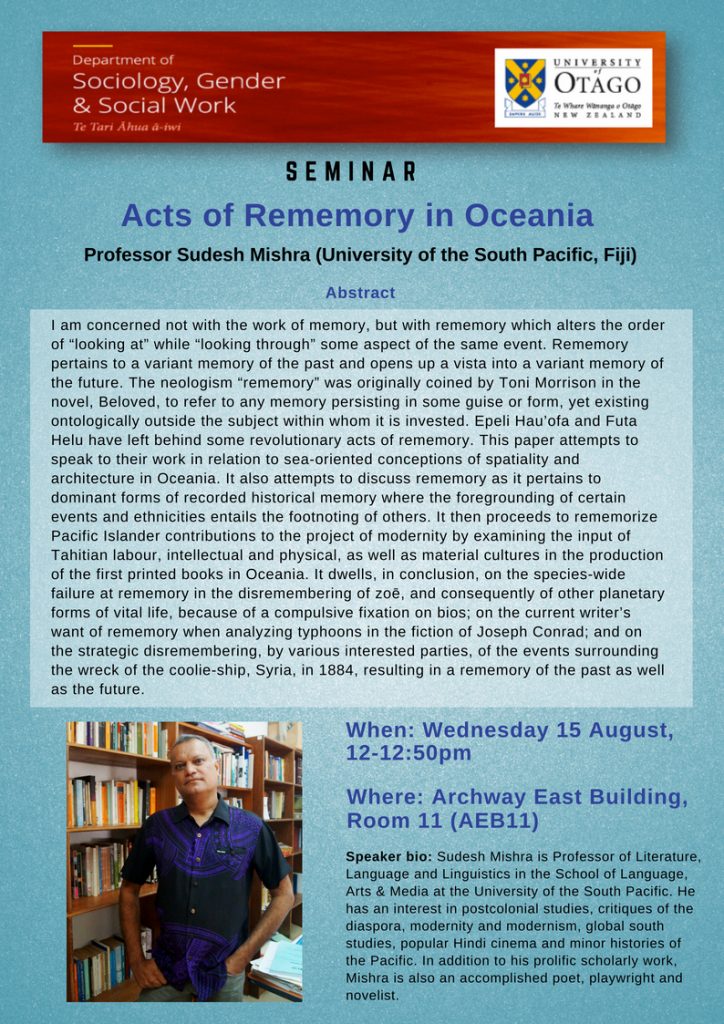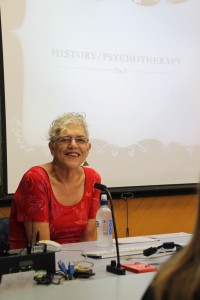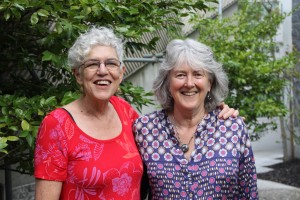Research Seminar: Acts of Rememory in Oceania
Professor Sudesh Mishra, a scholar, poet, playwright and novelist based at the University of the South Pacific, will present in the Department of Sociology, Gender and Social Work research seminar series on Wednesday 15 August. Details of time and location are on the poster below. All welcome.
Open Seminar: Museums, Digital Collections and Indigenous Futures
On 22 February the Centre is hosting an open seminar featuring two scholars who will speak about their current projects that aim to reconnect indigenous communities with objects and archives, making them available for future use and reinterpretation.
Location: Moot Court, 10th Floor, Richardson Building
All welcome.
Associate Professor Aaron Glass (Bard Graduate Center, New York) will discuss his involvement in producing a new critical edition of anthropologist Franz Boas’s 1897 landmark book, The Social Organization and Secret Societies of the Kwakiutl Indians, which uses digital media to link museums, archives and communities while recuperating ethnographic records for current and future use. Not only did the volume make draw upon existing museum collections from around the world, Boas and his indigenous collaborator, George Hunt, left a vast archive of unpublished materials relevant to the creation and afterlife of the 1897 text, including hundreds of pages of Hunt’s corrections and amendments. An international and collaborative endeavour to create a new annotated critical edition of the book – both in print and in digital formats – unites published and unpublished materials with current Kwakwaka’wakw knowledge. This presentation discusses that project and presents an interactive prototype for the digital edition that re-embeds ethnographic knowledge within Indigenous epistemological frameworks and hereditary protocols for access.
Associate Professor Conal McCarthy (Victoria University of Wellington) will outline two current trends in museum research in Australia and Aotearoa: one looking back to the history of collections, ethnology and colonisation, and the other looking forward to digital technology, co-curating and an emerging indigenous Museology. It will briefly introduce various projects which aim to reconnect tribal descendants to ancestral heritage through digital tools which enable the reassembly of scattered records, material culture and images. It will introduce the Marsden-funed project ‘Te Ao Hou: Imagining Worlds in New Zealand, 1900-1950’ led by Anne Salmond at Auckland University, which follows Māori leaders Apirana Ngata and Peter Buck through their involvement in the Dominion Museum ethnological expeditions, the Polynesian Society and the Board of Māori Ethnological Research. It considers the mobilising of relational concepts such as whakaapa/kinship, which were applied in Buck and Ngata’s ‘practical anthropology’, and the lessons of their experiments for both Māori museum practice today and contemporary tribal development generally.
Aaron Glass is an Associate Professor at Bard Graduate Center in New York City, and a Research Associate in the Division of Anthropology at the American Museum of Natural History. He specializes in First Nations art, material culture, media, and performance on the Northwest Coast of North America, as well as the history of anthropology and museums. His books include The Totem Pole: An Intercultural History (co-authored with Aldona Jonaitis, 2010), Objects of Exchange: Social and Material Transformation on the Late Nineteenth-Century Northwest Coast (the catalogue for an exhibition he curated at Bard Graduate Center in 2011), and Return to the Land of the Head Hunters: Edward S. Curtis, the Kwakwaka’wakw, and the Making of Modern Cinema (co-edited with Brad Evans, 2014).
Conal McCarthy is Director of the Museum & Heritage Studies programme at Victoria University of Wellington. He has published widely on museum history, theory and practice, including the books Exhibiting Māori (2007), Museums and Maori (2011), and Museum Practice (2015). He co-authored Collecting, ordering, governing: Anthropology, museums and government (Duke University Press, 2017), and co-edited a volume of essays in memory of Jonathan Mane-Wheoki (Victoria University Press). In 2018 he will publish the history of Te Papa (Te Papa Press), Curatopia: Museums and the future of research (co-edited with Philipp Schorch, Manchester University Press) and a book ‘Indigenous Museologies’ in Australia and Aotearoa New Zealand (Routledge). Among his current research projects is the history of museum visitation in Australia and New Zealand, and a Marsden funded project led by Professor Anne Salmond ‘Te Ao Hou: Transforming worlds in New Zealand 1900-1950’.
Writing Popular History
We are looking forward to hearing visiting scholar Dr. Nick Brodie’s presentation, “From PhD to Popular Author”.
After completing a doctoral dissertation in late medieval and early modern English vagrancy legislation, Nick Brodie has become a popular author of Australian history. His books, Kin: A Real People’s History of Our Nation (2015); 1787: The Lost Chapters of Australia’s Beginnings (2016); and The Vandemonian War: The Secret History of Britain’s Tasmanian Invasion (2017) mark him as one of Australia’s most prolific and critically acclaimed writers of popular history. In this talk Nick will discuss his journey from PhD to popular author. He will address the challenges of balancing scholarly integrity with popular accessibility, the opportunities for historians outside of the university sector, and will talk about some of the historical discoveries he has made along the way.
Please join us for Nick’s talk on Wednesday 15 November in Burns 5, starting at 3.30.
Stripping Colonial Studies Back to Their Bones
The Centre’s research seminar series resumes on Friday 29 September with a presentation by Dr. Charlotte King (Department of Anatomy).
Her talk is titled: “Stripping Colonial Studies Back to Their Bones: Combining bioarchaeology and history to look at European settlement of Tokomairiro”.
Charlotte will discuss the recent excavation of ‘forgotten’ areas of the St John’s Anglican cemetery in Milton, which has given bioarchaeologists an unprecedented opportunity to reconstruct the biological histories of some of the first European settlers in the Otago region. This talk will detail what archaeologists can do to shed light on the lives of these settlers, and how this might intersect with the social histories generated by historians.
Please join us on Friday 29 September at the Hocken Library Seminar room, 90 Anzac Avenue for this talk, which begins at 3.30. Afternoon tea is provided.
All are welcome.
Inter-Colonial Exchange, Rivalry, and Cooperation in New Guinea: 1890-1945
Maaike Derksen, who is a Visiting Scholar with the Centre for Research on Colonial Culture, will present a research seminar on Wednesday 2 November on her current research relating to New Guinea. The talk begins at 11am in Te Iringa Kōrero (R3S10), on the third floor of Te Tumu: School of Māori, Pacific and Indigenous Studies. We hope to see you there on November 2nd!
Abstract
The 141 Meridian East was established as a colonial border across the Island of New Guinea in 1895. This border divided New Guinea and the adjacent Islands among three foreign powers; the Netherlands, Germany and Britain (later Australia). Nowadays it still effectively acts as one of colonial cartography’s boundaries, separating ‘Asia’ from ‘the Pacific’. In colonial and contemporary maps of (South) East Asia alike, one can see that Papua New Guinea is often curiously absent, while maps of the Pacific stop short of the New Guinea boundary. In this talk I examine the ways in which New Guinea offers an excellent opportunity to explore imperial interconnections and historicize the exchanges, rivalries, and cooperation that resulted.
The last decade, New Imperial scholarship has paid attention to (trans) imperial networks and the connection between motherland and colony within individual colonies. However, this neglects the economic, political, cultural, religious, migratory and cross-cultural entanglements that took place across the peripheries— between ‘neighboring’ colonies. The approach I propose challenges nationalist views of colonialism as well as such rigid views of ‘colonial’ boundaries. With a narrow lens of regional history (New Guinea) combined with the conceptual approach of inter-colonial entanglements I will be able to emphasize the complexities and messy realities of colonial encounters. Especially when entanglements between different actors are highlighted, one can see that colonial boundaries were fluid— that there was movement of goods, knowledge, and people, a formation of networks, shared internal and external threats to security. New Guinea offers numerous cases of cross-border exchange that are worth exploring; the establishment of colonial authority/administration; the networks of traders, pearl divers and bird of paradise hunters, the missionary endeavor of studying, civilizing and converting the indigenous population; the exploring, mapping of the region via scientific and military expeditions; the ‘pacification’ process, the invasion of Japan.
Biography
Maaike Derksen is a PhD candidate in at the History Department and Institute for Gender studies at the Radboud University of Nijmegen. Her research interests focus on colonial history, Christian missions, colonial anthropology, scientific expeditions and the Pacific War in the Dutch East Indies.
Screen Wars: Remaking the New Zealand Wars in Celluloid and Pixels
Centre member, Associate Professor Annabel Cooper, is presenting a video conference seminar for the The Identities Network: Constructing and Contesting Dominant Identities in Aotearoa on Tuesday 1 November, beginning at 3pm.
Annabel will be discussing her current project Screen Wars: Remaking the New Zealand Wars in Celluloid and Pixels, a book on screen productions relating to the New Zealand Wars, from 1925 until the present day. The book covers fictional and non-fictional treatments, and film, television and digital media. One distinctive quality that they all share makes screen stories a particularly significant mode of making history about the colonial past: their creation involves both Māori and Pākehā actors, historical advisors, and to greater or lesser extent, crew. For most of these productions the film-makers also elected to film at or near historical locations. So, film productions operate as sites of encounter as well as sites of knowledge production. To what extent are the traces of these encounters, and these whenua, apparent on the screen? Each of these productions created a colonial past for a specific present. This body of successive reiterations provides an index to cultural memory of the colonial past. So, the question of which historical events seemed most compelling to successive generations, how the same figures were rendered at different historical moments, and the shifting emotional registers as the wars came to be thought of in different ways, is also central to this study.
In this session Annabel will take two examples from her book to discuss the way each is shaped by the tangata and the whenua of their production, by their filming on location, and by the traces of their presents as they render their pasts.
Venue: Your University videoconference room or your desktop
Time: Tuesday 1 November, 3 – 4pm
Register: Email Melanie m.milicich@auckland.ac.nz stating the seminar name and venue Chair: Avril Bell
Public Lecture on Visualizing Cultural Heritage
The Department of English and Linguistics, the Postcolonial Studies Research Network, and the Centre for Research on Colonial Culture are pleased to host Professor Martina Ghosh-Schellhorn, Saarland University, Saarbrücken, Germany, from 14-18 March, 2016. Professor Ghosh-Schellhorn holds the Inaugural Chair in Transcultural Anglophone Studies at Saarland University. Her wide-ranging research areas include literary and cultural studies, popular culture, intermediality, popular and art-house film, diaspora studies, memory studies, museology, material culture, pedagogy and curriculum development and the canon.
While at Otago, she will give two presentations, to which all are invited.
Open Lecture
Tuesday 15 March, 5.15pm-6.15pm, Archway 2 Lecture Theatre
Hosted by The Postcolonial Studies Research Network and the Centre for Research on Colonial Culture
“Re-Configuring Government Houses: Virtual Models and Life-Worlds in Transcultural Perspective”
This talk concerns a fresh approach to visualizing cultural heritage in a Transcultural Anglophone Studies (TAS) context. In collaboration with Artificial Intelligence experts, we have undertaken research into the material history of Empire so as to re-visit received historiographies with an aim to revising them in the light of contemporary analytical tools. The focus is on British Government Houses in transcultural perspective.
What was it like to live in a British Government House? I would like to use TAS’s xml 3D virtual model of Government House Calcutta (1803-) to demonstrate the advantages of using computer technology to support research into the field of colonial architecture by incorporating into it evidence of the various life-worlds found here. Besides taking a virtual 360o –tour of the building and its grounds, we will also be zooming in to one of its most representative interiors, the Throne Room. Accompanying us on our tour are a selection of the epistolary, autobiographical, as well as pictorial materials left us by the former incumbents of the House, the objects that they chose to be surrounded by, and the current use to which this still-functioning edifice is being put.
Department of English and Linguistics seminar presentation
Friday 18 March, 4.00-m-5.00pm, in Burns 4 Lecture Theatre
“Representing the Beautiful Forevers: Subaltern Lives Straight From the Page to the Stage?”
This talk, freely borrowed as its title is from Katherine Boo’s National Book Award winner, Behind the Beautiful Forevers (2012), seeks to address the problematic field of the so-called ‘Third World’ slum. I will be looking at Boo’s text as a project that sets out to (re-)present, for a ‘global’ readership, the lives of these Others, before moving to a recent example of another ‘global’ project: the much praised Behind the Beautiful Forevers as scripted by David Hare and performed by the National Theatre (Nov. 2014 – April 2015). What, we could ask, are the consequences when Boo’s narrative about Mumbai slum ‘dwellers’ [sic] is adapted for a mainstream British stage? Should we join the critics in their almost unanimous praise of a successful and, moreover, prescient transcultural stage production that claims to be ‘epic theatre’? What exactly are the implications of this packaging for consumption of subaltern life-narratives?
In Search of Almighty Voice
In this talk Professor Bill Waiser examines why the Willow Cree man Almighty Voice was the most wanted fugitive in Canada in the late nineteenth century and how his story and fate have been interpreted since his violent 1897 death at the hands of the North West Mounted Police.
The Centre is delighted to be hosting award-winning historian Bill Waiser (University of Saskatchewan), who will give a talk on his current research project on Wednesday March 9th in Burns 5 (Arts Building), beginning at 3.30.
Bill specializes in western Canadian history. He has been awarded the Saskatchewan Order of Merit, elected a fellow of the Royal Society of Canada, granted a D.Litt., and is a University of Saskatchewan Distinguished Chair (Distinguished Professor Emeritus). His most notable publications include: Saskatchewan: A New History (2005), winner of the Clio Prize, Canadian Historical Association; and with Blair Stonechild, Loyal Till Death: Indians and the North-West Rebellion (1997), a finalist for the Governor General’s Literary Award for non-fiction.
This talk is free and open to the public. Please come along!
Narratives of Colonial Conflict
This afternoon CRoCC member Associate Professor Annabel Cooper is presenting her research in the Department of Sociology, Gender and Social Work seminar series. The topic is ‘Narrating Colonial Conflict in the Early 1980s: Some Reflections on the Culture Moment of Utu‘. Her seminar examines how Utu re-makes the colonial past within a tumultuous present. It traces the film’s links to a series of documentaries of the same era, including Bastion Point – Day 507 (Mita, Narbey, Pohlmann, 1980), The Bridge – A Story of Men in Dispute (Pohlmann, Mita, 1982), and Patu! (Mita, 1983), and to the drama series The Governor (1977); and it investigates the contributions of significant individuals involved in the production, including Keith Aberdein, Wi Kuki Kaa, Merata Mita, and Anzac Wallace.
Annabel’s seminar begins at 3pm this afternoon at 530 Castle Street (530 C1).




